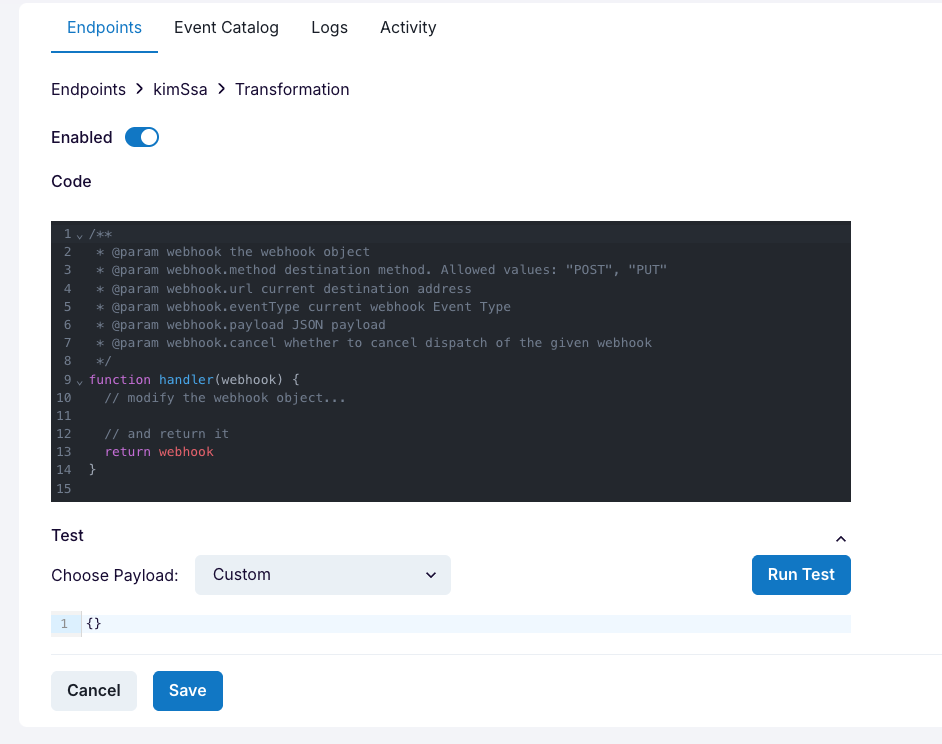Justt Webhook Transformations
This guide explains how to write and implement webhook transformations in the Justt system, allowing you to modify webhook behavior, payloads, and routing before delivery.
navigation
under the advanced ta,b enable the transformation tuggel

Once it anable you can write your transformation

How to Write a Transformation
Justt expects a Transformation to declare a function named handler. Justt will pass a WebhookObject to this function as its only argument, and expects the function to always return a WebhookObject.
WebhookObject Structure
WebhookObject is a JSON object containing 4 properties:
method- A string representing the HTTP method the webhook will be sent with. It is always"POST"by default, and its only valid values are"POST"or"PUT"url- A string representing the endpoint's URL. It can be changed to any valid URLpayload- Contains the webhook's payload as a JSON object. It can be changed as neededcancel- A Boolean which controls whether or not to cancel the dispatch of a webhook. This value defaults tofalse. Note that canceled messages appear as successful dispatches
Important: The Transformation will only work if the handler function returns the modified WebhookObject.
Basic Example
Suppose that sometimes, your customer wants to redirect webhooks to a custom URL instead of the endpoint's defined URL. They only want to do this redirect if a custom URL is present in the webhook payload. They can write a transformation like this:
function handler(webhook) {
if (webhook.payload.customUrl) {
webhook.url = webhook.payload.customUrl;
}
return webhook;
}Great! The webhook is redirected to the custom URL if the customUrl property exists on the payload. Otherwise, it is sent to the endpoint's defined URL.
function handler(webhook) {
// Transform Justt payload to match external system format
const transformedPayload = {
transaction_id: webhook.payload.chargeback_id,
dispute_amount: webhook.payload.amount,
currency_code: webhook.payload.currency,
merchant_reference: webhook.payload.reference_id,
status: mapJusttStatusToExternal(webhook.payload.status),
created_at: webhook.payload.created_date,
metadata: {
justt_id: webhook.payload.id,
original_event: webhook.payload.event_type
}
};
webhook.payload = transformedPayload;
return webhook;
}
function mapJusttStatusToExternal(justtStatus) {
const statusMap = {
'waiting_for_data': 'pending',
'building_evidence': 'in_progress',
'pending_psp_results': 'submitted',
'not_represented': 'closed'
};
return statusMap[justtStatus] || 'unknown';
}Best Practices
Error Handling
Always include error handling in your transformations:
function handler(webhook) {
try {
// Your transformation logic here
if (webhook.payload && webhook.payload.amount) {
webhook.payload.formatted_amount = `$${webhook.payload.amount.toFixed(2)}`;
}
return webhook;
} catch (error) {
// Log error and return original webhook to prevent delivery failure
console.error('Transformation error:', error);
return webhook;
}
}Validation
Validate webhook structure before transforming:
function handler(webhook) {
// Validate required properties
if (!webhook || !webhook.payload) {
return webhook;
}
// Validate required payload fields
if (!webhook.payload.chargeback_id || !webhook.payload.event_type) {
console.warn('Missing required fields in webhook payload');
return webhook;
}
// Proceed with transformation
webhook.payload.processed_at = new Date().toISOString();
return webhook;
}Performance Considerations
Keep transformations lightweight and efficient:
function handler(webhook) {
// Avoid complex operations or external API calls
// Use simple object manipulation and built-in functions
const payload = webhook.payload;
// Quick property checks
if (payload.priority_level === 'urgent') {
webhook.url = 'https://api.example.com/urgent-endpoint';
}
return webhook;
}Testing Transformations
Before deploying transformations to production:
- Test with sample webhook payloads
- Validate that the returned
WebhookObjecthas the correct structure - Check edge cases (null values, missing properties)
- Verify that transformations don't break downstream systems
- Monitor transformation performance and error rates
Common Pitfalls
- Forgetting to return the webhook object - Always return the modified
WebhookObject - Mutating the original object unsafely - Consider using object spread or deep cloning for complex transformations
- Not handling edge cases - Check for null/undefined values before accessing nested properties
- Complex logic - Keep transformations simple and focused on single responsibilities
Updated 6 months ago